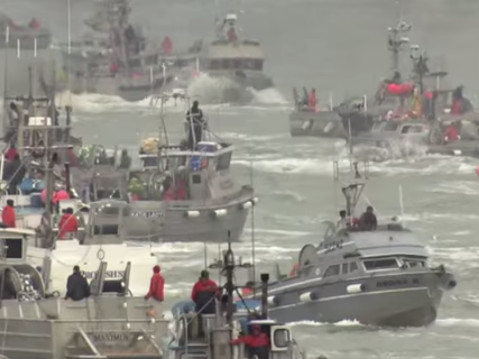Critical Time for Oceans

All it takes is one incredibly beautiful day to remind me why I live in Isla Vista. One day a week ago reminded me of summer. People streamed down the streets wearing bathing suits and carrying beach towels. The sand was like a beacon, drawing everyone to it. Even during the colder months, it is a big draw for surfing, bird watching, or just walking. Some days, it can be spectacular, especially, during low tide when you might see an octopus or other sea animal in one of the many pools.
Having access to an amazing ocean environment isn’t something we can take for granted. UCSB Professors Douglas McCauley and Robert Warner, along with a consortium of scientists, recently published a paper called “Marine defaunation: Animal loss in the global ocean” in the journal Science that claims that the health of the oceans is at a critical point. The authors compare the current situation in the ocean to that experienced on land leading up to the Industrial Revolution. They say people have the opportunity to change their behavior during this century and turn the tide, or we will wreak havoc on the ocean.
Lead author McCauley said in the video above, “The oceans are arguably some of the last pieces of wilderness on the planet. We must learn from our management and mismanagement of the [land] ecosystem in order to avoid an equally devastating effect for the oceans.”
While there are a number of threats to the health of the ocean environment, the authors highlight some in particular. One of these problems includes the use of highly efficient, yet destructive, fishing methods. In the past, a lone fisherman might catch enough to fill his boat and go home. Nowadays, fishing may be done using such things as helicopters and satellite-guided super trawlers. This is a quick way to deplete the ocean stores.
This isn’t the only way people are affecting the ocean in a negative way. Another is through global warming, which is causing ocean temperatures to change and acidity levels to rise. These changes are impacting ocean wildlife. Scientists have detailed the migration of species of fish from one habitat to another to find a more livable water temperature, a type of migration that can have a chain reaction. Other species may be left without their food source, and people who depended on a certain animal for their livelihood may be out of luck. In the future, these types of migrations might become common, and so could extinctions.
An abstract from the paper says:
“Although defaunation has been less severe in the oceans than on land, our effects on marine animals are increasing in pace and impact. Humans have caused few complete extinctions in the sea, but we are responsible for many ecological, commercial, and local extinctions. Despite our late start, humans have already powerfully changed virtually all major marine ecosystems.”
Co-author of the paper, Steve A. Palumbi from Hopkins Marine Stations at Stanford University, said in the video, “One way to look at this is that this is the century of choice for the oceans. We can choose to do everything we can to protect it, or we can leave things go as they are.” He added, “And we won’t know what the oceans will look like, but it won’t be like this, and it won’t be supporting us and other humans the way we want it to.”
Unfortunately, the scientists’ plea for action may be ignored. For years, scientists issued warnings about global warming and the effect it would have on the environment if people didn’t change their behavior, but few listened. However, anyone who loves the beach, the animals that live on and near it, and our Santa Barbara lifestyle should pay attention. The scientists who authored this paper have emphasized the fact that there is hope. They said that the ocean’s relative health, with few examples of extinctions, work in its favor. If people learn from the mistakes made on land and chart a different course, things could go better for the ocean.
They suggested setting up large marine reserves that couldn’t be used for fishing or industrial development, adding that this in itself would not be enough. They suggest public policy would need to be developed that would protect the oceans both inside and outside these reserves.



